#Sherlock's Jerusalem Meta
Explore tagged Tumblr posts
Text
~Sherlock's Own Jerusalem~
..The Great Game, A Sonnet & Bus Number 14
In the story The Great Game, our two heroes are about to incur the wrath of moriarty-as-two-faced-god. He was in fact the 'Janus Figure' in Who's Vermeer Is This? and has laid his plans to lure our men into a showdown.
Sherlock and John have a little domestic. It seems they weren't seeing eye to eye on things. Sherlock felt very misunderstood by John, on his blog. It seems that Sherlock doesn't give a flying fig about the Solar System. Go figure.

"Ordinary people fill their heads with all kinds of rubbish, and that makes it hard to get at the stuff that matters. Do you see?"
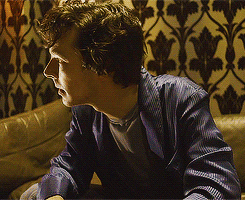
Which John just finds totally weird.
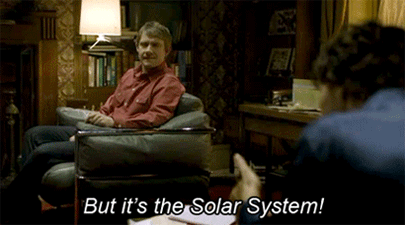
Queue Sherlock sulking and John 'getting some air'. But throughout the various cases, during this time, John shows how invaluable he is, following up leads, laid out by Janus, gathering important evidence; even enduring a painful interview with Mycroft. He had indeed become Sherlock's second sight; his other half.

Following some long, arduous hours of investigating, after pushing John in all different directions, Sherlock spies a bus with the number 14, out of the taxi window, and remembers his Shakespeare; something that was quite fitting for this particular moment.

And Sherlock attempts to tell John how important he is to him. "Beautiful, isn't it?"
“I thought you didn’t care about things like that.”
"Doesn’t mean I can’t appreciate it.
(They walk into the Arches.)Sonnet 14...a paraphrase.
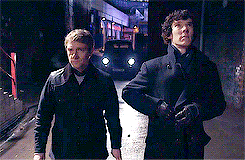
"I do not receive my knowledge or make my decisions by the stars; though I have enough training in astrology to do so, I cannot predict good luck or bad, Or plagues, or famine, or the weather; Nor can I say what will happen at any given moment in our daily lives,

Alloting to each man his thunder, rain, and wind [i.e., he cannot foretell our personal troubles], Or even tell princes if things will go well for them, By frequent omens that I see in the heavens:

But from your eyes alone do I derive my knowledge, And they are my constant stars, in which I read such art (gain such knowledge)that I see truth and beauty will live together in harmony, If you would only turn your focus from yourself to creating a child; or else this is my prophecy: that truth and beauty will all end when you die."
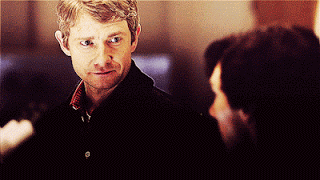
Because for Sherlock, #Johnwatsonlives means #Sherlocklives
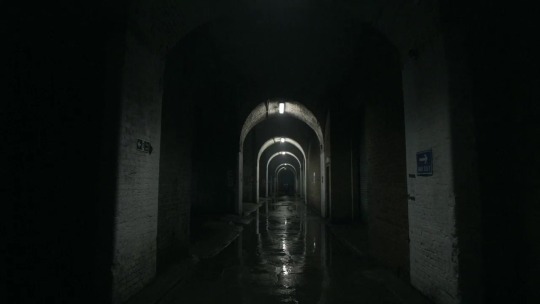
And as Sherlock and John pass through several open gateways, moving deeper into the dark temple of Janus, not heeding the sign on the wall, saying the WAY OUT was backwards, they have already made up their minds that they are, in fact a team...
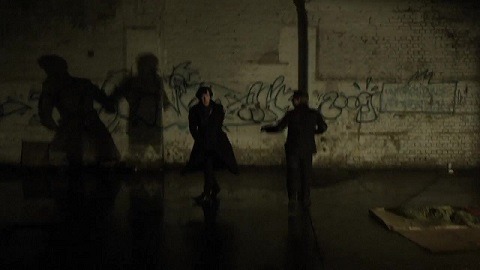
...As Sherlock begins his battle with Janus, for John, and for himself.

When Christ Came To England
Fun Fact: In the Bus #14 pic above, there is a large shot of a Michael Jackson sign, with the word Thriller. Also, a popular play, Jerusalem by Jez Butterworth. The play makes frequent allusions to William Blake's lyrics to the song "Jerusalem", from which its title is derived. The poem was inspired by the apocryphal story that a young Jesus, accompanied by Joseph of Arimathea, a tin merchant, travelled to what is now England and visited Glastonbury during his unknown years.The Christian church in general, and the English Church in particular, has long used. Jerusalem as a metaphor for Heaven, a place of universal love and peace.
In the most common interpretation of the poem, Blake implies that a visit by Jesus would briefly create heaven in England, in contrast to the "dark Satanic Mills" of the Industrial Revolution.

Jerusalem
And did those feet in ancient time, Walk upon England's mountains green: And was the holy Lamb of God, On England's pleasant pastures seen! And did the Countenance Divine, Shine forth upon our clouded hills? And was Jerusalem builded here, Among these dark Satanic Mills? Bring me my Bow of burning gold; Bring me my Arrows of desire: Bring me my Spear: O clouds unfold! Bring me my Chariot of fire! I will not cease from Mental Fight, Nor shall my Sword sleep in my hand: Till we have built Jerusalem, In England's green & pleasant Land.
Beneath the poem Blake inscribed a quotation from the Bible: "Would to God that all the Lords people were Prophets" Numbers XI.ch 29.v.

The original text is found in the preface Blake wrote for inclusion with Milton, a Poem, following the lines beginning "The Stolen and Perverted Writings of Homer & Ovid: of Plato & Cicero. Blake lived in London for most of his life, but wrote much of Milton while living in the village of Felpham in Sussex! *An extract of the hymn was heard in the 2013 Doctor Who episode "The Crimson Horror" although that story was set in 1893, i.e., before Parry's arrangement.
Dedicated to The First Time Ever I Saw Your Face from @ebaeschnbliah and The Sonnets johns-lament-sonnet-58 59-the-cycle-of-life & irene-the-baker-st-venus My Romantic series.
Tags under cut
@shylockgnomes @sherlockshadow @theragesniff @shag-me-senseless-Watson @darlingtonsubstitution @just-sort-of-happened @gosherlocked @may-shepard @monikakrasnorada @possiblyimbiassed @sarahthecoat @loveismyrevolution @fellshish @finalproblem @brilliantorinsane @let-bijohns-be-bi-johns @sherlockspeare @rqnarok @88thparallel @artfulkindoforder @artemisastarte @eveningsoother @simpleanddestructivechemistry
X
#sonnet 14#Shakespeare No Fear#The Great Game#The Two-Faced God Janus#It's Never Twins#The Solar System#When Christ Came To England#Sherlock's Jerusalem Meta#the first time ever i saw your face#Sussex!#William Blake#Milton#Dr Who#The Crimson Horror
86 notes
·
View notes
Text
WHAT I HAVE BEEN READING LATELY
Kage Baker’s Company Series
In the Garden of Iden
Sky Coyote
Mendoza in Hollywood
The Graveyard Game
The Life of the World to Come
The Children of the Company
The Machine's Child
The Sons of Heaven
The Empress of Mars
Not Less than Gods
Nell Gwynne's On Land and At Sea
Black Projects, White Knights: The Company Dossiers
Gods and Pawns
In the Company of Thieves
Ø Science Fiction written by a woman with Asperger’s. Wildly uneven. Main protagonist is female, but there are lots of POV characters, male and female.
Ø Big ideas.
Ø Lots of adventure, some action.
Ø Small doses of humor.
Neil Gaiman
Good Omens (with Sir Terry Pratchett)
Neverwhere
Stardust
American Gods
Anansi Boys
The Graveyard Book
The Ocean at the End of the Lane
Ø Neil’s books are a road trip with Carl Jung, Joseph Campbell and a baggie full of sativa.
Ø Ideas are incidental. The Milieu’s in charge.
Ø Adventure happens whether you like it or not.
Ø Cosmic humor. The joke’s on us.
Connie Willis’s Oxford Time Travel Series
Firewatch
Doomsday Book
To Say Nothing of the Dog (and the novel that inspired it – Jerome K. Jerome’s Three Men in a Boat)
Blackout/All Clear
Assorted:
The Last of the Winnebagos
Ø Connie loves her historical research. Blackout/All Clear actually lasts as long as the Blitz, but anything in the Oxford Time Travel series is worth reading. Doomsday Book reads like prophecy in retrospect.
Ø One idea: Hi! This is the human condition! How fucking amazing is that?!?
Ø Gut-punch adventure with extra consequences. Background action.
Ø I’d have to say that Doomsday Book is the funniest book about the black death I’ve ever read, which isn’t saying much. To Say Nothing of the Dog is classic farce, though. Girl’s got range.
Neal Stephenson
Snow Crash (After the apocalypse, the world will be ruled by Home-Owners Associations. Be afraid.)
Cryptonomicon
Anathem
Seveneves
Ø Neal writes big, undisciplined, unfocused books that keep unfolding in your mind for months after you’ve read them. He’s a very guy-type writer, in spite of a female protagonist or two. Seveneves, be warned, starts out brilliant and devolves into extreme meh.
Ø Big. Fucking. Ideas.
Ø Battles, crashes, fistfights, parachute jumps, nuclear powered motorcycles and extreme gardening action. Is there an MPAA acronym for that?
Ø Humor dry enough to be garnished with two green olives on a stick.
Christopher Moore
Pine Cove Series:
Practical Demonkeeping
The Lust Lizard of Melancholy Cove
The Stupidest Angel: A Heartwarming Tale of Christmas Terror (Okay, yeah, Christmas. But Christmas with zombies, so that’s all right.)
Fluke (Not strictly Pine Cove, but in the same universe. Ever wonder why whales sing? They’re ordering Pastrami sandwiches. I’m not kidding.)
Death Merchant Chronicles:
A Dirty Job
Secondhand Souls (Best literary dogs this side of Jack London)
Coyote Blue (Kind of an outlier. Overlapping characters)
Shakespeare Series:
Fool
The Serpent of Venice
Shakespeare for Squirrels
Assorted:
Island of the Sequined Love Nun (Cargo cults with Pine Cove crossovers. I have a theory that the characters in this book are direct descendants of certain characters in Stephenson’s Cryptonomicon.)
Lamb: The Gospel According to Biff, Christ’s Childhood Pal (So I have a favorite first-century wonder rabbi. Who doesn’t?)
Sacre Bleu
Noir
Ø Not for the squeamish, the easily offended, or those who can’t lovingly embrace the fact that the human species is pretty much a bunch of idiots snatching at moments of grace.
Ø No big ideas whatever. Barely any half-baked notions.
Ø Enthusiastic geek adventure. Action as a last resort.
Ø Nonstop funny from beginning to end.
Ben Aaronovitch’s Rivers of London Series
Rivers of London
Moon Over Soho
Whispers Under Ground
Broken Homes
Foxglove Summer
The Hanging Tree
The Furthest Station
Lies Sleeping
The October Man
False Value
Tales From the Folly
Ø Lean, self-deprecating police procedurals disguised as fantasy novels. Excellent writing.
Ø These will not expand your mind. They might expand your Latin vocabulary.
Ø Crisply described action, judiciously used. Whodunnit adventure. It’s all about good storytelling.
Ø Generous servings of sly humor. Aaronovitch is a geek culture blueblood who drops so many inside jokes, there are websites devoted to indexing them.
John Scalzi
Old Man’s War Series:
Old Man’s War
Questions for a Soldier
The Ghost Brigades
The Sagan Diary
The Last Colony
Zoe’s Tale
After the Coup
The Human Division
The End of All Things
Ø Star Trek with realpolitik instead of optimism.
Ø The Big Idea is that there’s nothing new under the sun. Nor over it.
Ø Action-adventure final frontier saga with high stakes.
Ø It’s funny when the characters are being funny, and precisely to the same degree that the character is funny.
Assorted:
The Dispatcher
Murder by Other Means
Redshirts (Star Trek, sideways, with occasional optimism)
Ø Scalzi abandons (or skewers) his space-opera tendencies with these three little gems of speculative fiction. Scalzi’s gift is patience. He lets the scenario unfold like a striptease.
Ø What-if thought experiments that jolt the brain like espresso shots.
Ø Action/misadventure as necessary to accomplish the psychological special effects.
Ø Redshirts is satire, so the humor is built-in, but it’s buried in the mix.
David Wong/Jason Pargin
John Dies at the End
This Book is Full of Spiders: Seriously, Dude, Don’t Touch It
What the Hell Did I Just Read?
Ø Pargin clearly starts his novels with a handful of arresting scenes and images, then looses the characters on an unsuspecting world to wander wither they will.
Ø Ideas aren’t as big or obvious as Heinlein, but they are there to challenge all your assumptions in the same way that Heinlein’s were.
Ø Classic action/adventure for anyone raised on Scooby-Doo.
Ø Occasional gusts of humor in a climate that’s predominantly tongue-in-cheek.
Jodi Taylor’s Chronicles of St. Mary’s Series
Just One Damned Thing After Another
The Very First Damned Thing
A Symphony of Echoes
When a Child is Born*
A Second Chance
Roman Holiday*
A Trail Through Time
Christmas Present*
No Time Like the Past
What Could Possible Go Wrong?
Ships and Stings and Wedding Rings*
Lies, Damned Lies and History
The Great St Mary’s Day Out*
My Name is Markham*
And the Rest is History
A Perfect Storm*
Christmas Past*
An Argumentation of Historians
The Battersea Barricades*
The Steam Pump Jump*
And Now for Something Completely Different*
Hope for the Best
When Did You Last See Your Father?*
Why Is Nothing Ever Simple*
Plan For The Worst
The Ordeal of the Haunted Room
Ø The * denotes a short story or novella. Okay, try to imagine Indiana Jones as a smartassed redheaded woman with a time machine and a merry band of full contact historians. I love history, and I especially love history narrated by a woman who can kick T. Rex ass.
Ø The ideas are toys, not themes. Soapy in spots.
Ø Action! Adventure! More action! More adventure! Tea break. Action again!
Ø Big, squishy dollops of snort-worthy stuff.
Laurie R. King’s Mary Russell Series
The Beekeeper's Apprentice
A Monstrous Regiment of Women
A Letter of Mary
The Moor
Jerusalem
Justice Hall
The Game
Locked Rooms
The Language of Bees
The God of the Hive
Beekeeping for Beginners
Pirate King
Garment of Shadows
Dreaming Spies
The Marriage of Mary Russell
The Murder of Mary Russell
Mary Russell's War And Other Stories of Suspense
Island of the Mad
Riviera Gold
The Art of Detection (Strictly speaking, this is in the action!lesbian Detective Kate Martinelli series, but it crosses over to the Sherlock Holmes genre. If you’ve ever wondered how Holmes would deal with the transgendered, this is the book.)
Ø Sherlock Holmes retires to Sussex, keeps bees, marries a nice Jewish girl who is smarter than he is and less than half his age and he’s mentored since she was fifteen in an extremely problematic power dynamic relationship that should repulse me but doesn’t, somehow, because this is the best Sherlock Holmes pastiche out there. Mary should have been a rabbi, but it is 1920, so she learns martial arts and becomes an international detective instead. Guest appearances by Conan Doyle, Kimball O’Hara, T.E. Lawrence, Cole Porter, and the Oxford Comma.
Ø Nothing mind-expanding here, unless the levels of meta present in a fictional world that is about how the fictional world might not be as fictional as you thought come as a surprise to anyone in the era of tie-in books, films, tv, interactive social media and RPGs.
Ø If these two geniuses can’t catch the bad guys with their dazzling brilliance, they will happily kick some ass. Adventure takes center stage and the action sequences are especially creative.
Ø Amusement is afoot.
Jasper Fforde’s Thursday Next Series
The Eyre Affair
Lost in a Good Book
The Well of Lost Plots
Something Rotten
First Among Sequels
One of Our Thursdays is Missing
The Woman Who Died a Lot
Ø In a world where Librarians are revered and Shakespeare is more popular than the Beatles, someone has to facilitate the weekly anger-management sessions for the characters of Wuthering Heights, if only to keep them from killing each other before the novel actually ends. That someone is Thursday Next – Literature Cop.
Ø Mind-bending enough to give Noam Chomsky material for another hundred years.
Ø Adventure aplenty. Action? Even the punctuation will try to kill you.
Ø This is a frolicsome look at humorous situations filled with funny people. Pretty much a full house in the laugh department.
Sir Terry Pratchett’s Discworld Series/City Watch Arc
Guards! Guards!
Men at Arms
Feet of Clay
Jingo
The Fifth Elephant
Night Watch
Thud!
Snuff
Raising Steam
Ø If this were a game of CLUE, the answer would be Niccolo Machiavelli in Narnia with a Monty Python. Everything you think you know about books with dragons and trolls and dwarves and wizards is expertly ripped to shreds and reassembled as social satire that can save your soul, even if it turns out you don’t really have one. Do not be fooled by the Tolkien chassis – there’s a Vonnegut-class engine at work.
Ø Caution: Ideas in the Mirror Universe May be Larger Than They Appear
Ø The City Watch arc has plenty of thrilling action sequences. Some other of the fifty-million Discworld novels have less. Every one of them is nonstop adventure. Most of the adventure, however, takes the form of characters desperately trying to avoid thrilling action sequences.
Ø Funny? Even though I’ve read every book in the series at least ten times, I still have to make sure I have cold packs on hand in case I laugh so hard I rupture something.
4 notes
·
View notes
Text
This is great. The liveblogs of these shows always tend to reveal something new. I recall a meta about the missile plans being compared to Agra & Mary; something about neither being needed. The memory stick was basically useless. Maybe someone might recall who. The group has enjoyed looking at Sherlock as metaphor. It's all too strong.
I would love you to look at my sherlocks-own-jerusalem. It has a theory of there being a sonnet embedded in the TGG. There were a couple of sonnet seekers but the one I found talks specifically about the solar system as a metaphor for love. Moriarty has been found cast as actual Janus.
I know @ebaeschnbliah also has a metaphoric meta on TGG.
Deducingbbcsherlock had an interesting theory tying Mycroft's dieting to Sherlock's drug abstinence.
@justanotherone16 does an awesome one on Grimms Fairytales paralleling episodes and
@221bookworm had one on Freud, Vampires & Fairytales
. @fellshish @madzither @detective-from-221b @bluebluenova @gosherlocked @brilliantorinsane
The Great Game + Five-Act Structure
me and @messedupsockindex did a TGG rewatch (i think we’re gonna do the whole show hell yeah hell yeah) and I did some liveblogging that turned into several metas on things i think are important in this episode, with the five-act structure being a Theme (though i went off on a real tangent RE: solar systems/framing and metaphors too). Read on if you dare.
First of all I learned that this was the first episode of the show that was filmed? I find that very interesting, I don’t know much about how to shoot a tv series, BUT if this was the first one that was ready to shoot, i wonder if that means it was the first one finished, and if it was the first one finished, is it because it’s The One that lays out the five-act structure of the whole show?
link to @fellshish ‘s most brilliant meta here
another small spot of evidence for this “TGG is the layout for the whole show” theory is that lots of little shots in this episode are also in the title sequence (could be a coincidence if they did indeed film this episode first, but also maybe not)
Throughout this episode, we are shown an ongoing conversation between Sherlock and John concerning Sherlock’s lack of basic knowledge about our solar system. It effectively frames the episode - one of the opening scenes being their “domestic” (fight), and the penultimate scene (before the pool scene) being the infamous “I won’t be in for tea” / “I’ll get milk and beans” tragedy. I want to liken this episode-long conversation to a technique I saw in a different show.
In this show (Masters of Sex starring the brilliant Michael Sheen and the formidable Lizzy Caplan), a man and a woman are having an affair with each other, but justifying it by saying they are simply “working” and that they’re not emotionally attached to each other (they’re sex researchers, so they “collect data” whenever they meet…it’s dumb.) Anyway, there’s a beautiful episode entitled “Fight” during which they are watching a boxing match in their hotel room while engaging in elaborate sexual roleplay with each other. While the boxing match plays in the background, they riff on what their lives would be like together if they really were the husband and wife duo that they pretend to be for the hotel staff. It’s intricate, and loaded, because you never know when they are acting within the roleplay, or talking honestly to each other about their feelings and pasts. They metaphorically duck and weave like boxers around their feelings and around each other. Their conversation often talks literally about boxing, too - The Fight is a tool through which the writers explore the characters’ bond for the viewer.
I see Moftiss using this same technique when I hear Sherlock and John going back and forth THROUGHOUT THE EPISODE about knowledge of the solar system. The first time they discuss it, you can feel John trying to understand why Sherlock comprehends things the way he does - why can something as basic as the solar system (or attraction) be allowed to slip through the cracks of his otherwise daunting intellect? And you can also feel Sherlock’s frustration with the way John perceives him - why should it MATTER if he doesn’t know the exact details of how the solar system (attraction) works - shouldn’t the fact that he knows it exists be enough, and if or when when he needs to, he can figure it out from there? They continue to explore the concept with each other as the episode goes on.

Here, John has accepted that Sherlock doesn’t (or thinks he doesn’t) care about the mechanics of something as basic as the solar system (attraction). So he asks, why comment on it? Sherlock says even if he doesn’t understand it, he still appreciates it. Telling.
In the final instance of this conversation, the penultimate scene of the episode, John tells Sherlock that maybe a little knowledge of the solar system might have come in handy after all. But Sherlock also has a point:
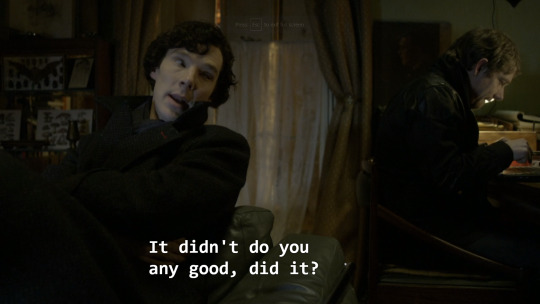
John’s knowledge of something so basic as attraction has been useless to him thus far.
If we’re gonna accept food = sex, I found it funny that John was “starving” and he found a head in the fridge. John, there’s head for dinner, if you want it! Even funnier that Sherlock’s response to “I’m starving” was that he was researching saliva. (I don’t love the food=sex thing, I just don’t think it’s intentional, but I do feel like it’s a valid interpretation here that Sherlock is subtextually begging John to let him suck it)
I’m too tired to figure out what Mycroft’s dental appointment could possibly mean but both of us were like??? My half-baked theory right now (borrowing from M theory) is that the “dental appointment” was actually Mycroft getting the shit kicked out of him by Moriarty/Mary/whoever the mastermind is, so that Mycroft would plant the missile plan crime for Sherlock?
okay so I never really realized this but Sherlock knows Jim is gay bc he uses hair product and then season 4 John has hella hair product….huh
Sherlock’s security outfit is queer coded but suddenly I can’t find any evidence of this I just…have it somewhere in my psyche that a police/security costume outfit like that was claimed by queer people and I can’t remember why?
For hostage number 3, the old woman, Moriarty (or whoever is on the other end of the computer) calls her “a funny one.” @messedupsockindex told me while we were watching about the midpoint of the five-act structure being the breakthrough, the point of no return, the point at which key knowledge is gained (from John Yorke’s Into The Woods, also brilliantly discussed here). I can’t help but think of this seemingly offhand line as a tiny clue to the importance of series 3 of BBC Sherlock. (In case you didn’t know, the midpoint of the whole show, if there are indeed going to be fifteen episodes, is…you guessed it…the best man speech).

The last Greenwich pip case that is solved, a case in which we have a hostage on the other end of a phone, is the fake painting. The solution to this case is “the Van Buren supernova” aka part of outer space, seen from our solar system. As I’ve argued above, the solar system is a metaphor/framing device used in this episode to subtextually discuss the engine of this entire show - Sherlock and John’s relationship. How very telling that Sherlock, even Sherlock, very nearly doesn’t get to this solution. But, when he does…

(me reading about the five act structure and realizing series four is fake)
Moriarty’s last few lines - I find this whole scene to be absolutely vital to understanding the point of the whole show, but especially the last bit.

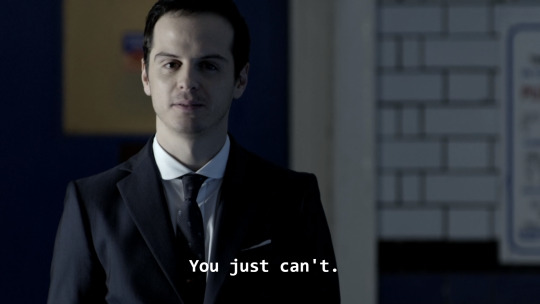
There is probably already someone who has explained/noticed this but…the exchange that Moriarty is responding to, that happened before he re-entered the room, was Sherlock and John getting the closest they ever get in the WHOLE show to discussing the sexual tension/attraction between them (I think I’m again standing on the shoulders of the legendary M theory here). John has taken a huge leap in choosing to bring up what “people” might think about Sherlock ripping his clothes off in a darkened swimming pool. Sherlock responds jokingly but not dismissively, and the logical next step would be to discuss what they themselves think about it…until of course they are interrupted by this, by literally being held at gunpoint.
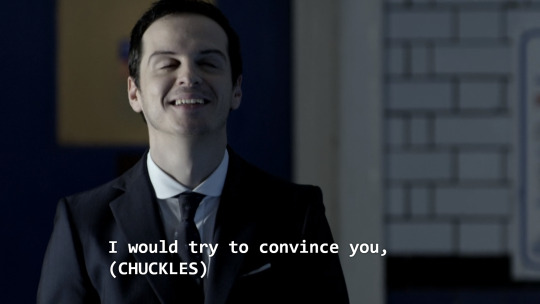
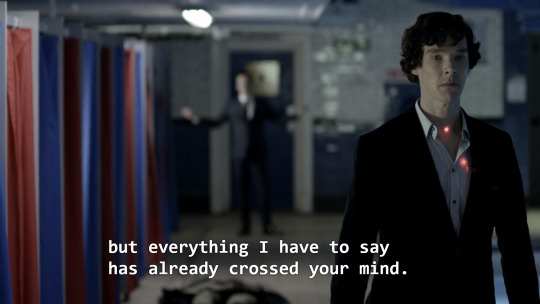
Moriarty’s lines here are apparently some pretty famous lines in ACD canon. I didn’t know the canon context, so it’s a little easier to just parse the lines in context of this scene. Moriarty wants to stop this discussion that Sherlock and John are about to have, and more broadly, whatever that conversation might lead to. He would try to convince them that they can’t be allowed to continue, but everything he has to say, all the convincing he could possibly do, has already crossed Sherlock’s mind (or both of their minds - it’s actually not specified who he’s talking to here). This is true because Sherlock and/or John are afraid to “continue” - discuss their feelings for each other - because of trauma and internalized homophobia. All the reasons that they shouldn’t “continue,” reasons that Moriarty could cite out loud, have already crossed their minds, probably more than once. I think this unspoken meaning makes so much more sense than taking Moriarty’s “you can’t be allowed to continue” to mean “you can’t be allowed to continue to solve crimes,” which is what it meant in ACD canon. And it’s a fantastic rework of an ACD canon line.
So… the end, I guess. I probably should have split this up into different posts…
#bbc sherlock#meta#tgg#watchalong#streaming meta#observations#the great game#m theory#solar system#circles#sonnets#5 part structure
119 notes
·
View notes
Text
Wow, lovely!
~Sherlock's Own Jerusalem~
..The Great Game, A Sonnet & Bus Number 14
In the story The Great Game, our two heroes are about to incur the wrath of moriarty-as-two-faced-god. He was in fact the ‘Janus Figure’ in Who’s Vermeer Is This? and has laid his plans to lure our men into a showdown.
Sherlock and John have a little domestic. It seems they weren’t seeing eye to eye on things. Sherlock felt very misunderstood by John, on his blog. It seems that Sherlock doesn’t give a flying fig about the Solar System. Go figure.

“Ordinary people fill their heads with all kinds of rubbish, and that makes it hard to get at the stuff that matters. Do you see?”

Which John just finds totally weird.

Queue Sherlock sulking and John 'getting some air’. But throughout the various cases, during this time, John shows how invaluable he is, following up leads, laid out by Janus, gathering important evidence; even enduring a painful interview with Mycroft. He had indeed become Sherlock’s second sight; his other half.

Following some long, arduous hours of investigating, after pushing John in all different directions, Sherlock spies a bus with the number 14, out of the taxi window, and remembers his Shakespeare; something that was quite fitting for this particular moment.

And Sherlock attempts to tell John how important he is to him. “Beautiful, isn’t it?” John: I thought you didn’t care about things like that. SHERLOCK: “Doesn’t mean I can’t appreciate it. (They walk into the Arches.) Sonnet 14…a paraphrase.

"I do not receive my knowledge or make my decisions by the stars; Though I have enough training in astrology to do so I cannot predict good luck or bad, Or plagues, or famine, or the weather; Nor can I say what will happen at any given moment in our daily lives,

Alloting to each man his thunder, rain, and wind [i.e., he cannot foretell our personal troubles], Or even tell princes if things will go well for them, By frequent omens that I see in the heavens:

But from your eyes alone do I derive my knowledge, And they are my constant stars, in which I read such art (gain such knowledge) That I see truth and beauty will live together in harmony, If you would only turn your focus from yourself to creating a child; Or else this is my prophecy: That truth and beauty will all end when you die.”

Because for Sherlock, #Johnwatsonlives means #Sherlocklives

And as Sherlock and John pass through several open gateways, moving deeper into the dark temple of Janus, not heeding the sign on the wall, saying the WAY OUT was backwards, they have already made up their minds that they are, in fact a team…

…As Sherlock begins his battle with Janus, for John, and for himself.

When Christ Came To England
Fun Fact: In the Bus #14 pic above, there is a large shot of a Michael Jackson sign, with the word Thriller. Also, a popular play, Jerusalem by Jez Butterworth. The play makes frequent allusions to William Blake’s lyrics to the song “Jerusalem”, from which its title is derived. The poem was inspired by the apocryphal story that a young Jesus, accompanied by Joseph of Arimathea, a tin merchant, travelled to what is now England and visited Glastonbury during his unknown years.The Christian church in general, and the English Church in particular, has long used. Jerusalem as a metaphor for Heaven, a place of universal love and peace.
In the most common interpretation of the poem, Blake implies that a visit by Jesus would briefly create heaven in England, in contrast to the “dark Satanic Mills” of the Industrial Revolution.

…Jerusalem…
And did those feet in ancient time, Walk upon England’s mountains green: And was the holy Lamb of God, On England’s pleasant pastures seen! And did the Countenance Divine, Shine forth upon our clouded hills? And was Jerusalem builded here, Among these dark Satanic Mills? Bring me my Bow of burning gold; Bring me my Arrows of desire: Bring me my Spear: O clouds unfold! Bring me my Chariot of fire! I will not cease from Mental Fight, Nor shall my Sword sleep in my hand: Till we have built Jerusalem, In England’s green & pleasant Land.
Beneath the poem Blake inscribed a quotation from the Bible: “Would to God that all the Lords people were Prophets” Numbers XI.ch 29.v.

The original text is found in the preface Blake wrote for inclusion with Milton, a Poem, following the lines beginning “The Stolen and Perverted Writings of Homer & Ovid: of Plato & Cicero. Blake lived in London for most of his life, but wrote much of Milton while living in the village of Felpham in Sussex! *An extract of the hymn was heard in the 2013 Doctor Who episode ”The Crimson Horror“ although that story was set in 1893, i.e., before Parry’s arrangement.
Dedicated to The First Time Ever I Saw Your Face from @ebaeschnbliah and The Sonnets johns-lament-sonnet-58 59-the-cycle-of-life & irene-the-baker-st-venus My Romantic series.
Tags under cut
Keep reading
#sherlock meta#tgg#bus 14#sonnet 14#moriarty=janus#the two-faced god janus#the solar system#john & sherlock#john watson lives means sherlock lives#william blake#sherlock's jerusalem meta#arrows of desire#when christ came to england#the first time ever i saw your face#sussex#milton#dr who in sherlock
86 notes
·
View notes